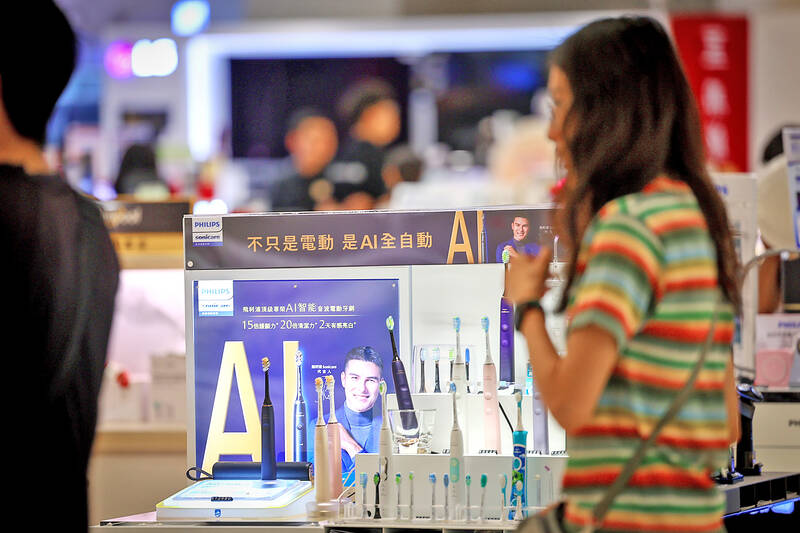The government’s business climate monitor last month flashed “yellow-red” for the second straight month as robust artificial intelligence (AI) demand from abroad continued to bolster industrial output and machinery imports, the National Development Council (NDC) said yesterday.
The monitor’s score stayed unchanged at 35, indicating that the nation’s economy is maintaining momentum, due to rising exports, industrial production and imports of electrical and machinery equipment, it said.
The council uses a five-color spectrum to indicate the nation’s economic health, with “red” suggesting a boom, “green” indicating steady growth and “blue” signifying recession. Dual colors mean the economy is transitioning to a stronger or worse state.

Photo: CNA
“The recovery appears less imbalanced with more sectors coming out of the woods,” council research director Wu Ming-huei (吳明蕙) told a media briefing in Taipei.
Taiwan’s export-oriented economy has benefited from strong demand for AI investment by US technology giants, Wu said.
Firms in the global AI supply chain appeared sturdy, while non-tech firms gradually emerged from inventory adjustments, the official said.
However, manufacturers of chemical, plastic and steel products remained affected by sharp competition from Chinese rivals and Beijing’s termination of favorable tax terms under the Economic Cooperation Framework Agreement, Wu said.
“There is little the Taiwanese government can do on this issue, which carries more political than economic implications,” the official said.
The index of leading indicators, which seeks to project the economic landscape in the next six months, increased 0.87 percent from one month earlier to 103.4, rising for the eighth month in a row, the council said.
All seven component measures displayed upward cyclical movements, consistent with Taiwan’s economic improvement, it added.
The index of coincident indicators, which reflects the current economic situation, increased 1.16 percent to 104.1, rising for the 14th consecutive month, the council said.
Almost all of the seven sub-indices gained points except the reading on the value of exports which weakened slightly from one month earlier.
The council is positive about the economic outlook, as local tech firms maintain leading positions in chipmaking and would show stronger interest in capacity expansion to meet customer needs, the council said.
However, Wu said firms should remain wary about monetary policy by major central banks and volatile geopolitical relationships, as the two factors would affect global trade and therefore, Taiwan’s exports.
In a related development, the consumer confidence index this month was 72.69, rising by an insignificant 0.49 point from last month, indicating a neutral assessment, a survey by National Central University (NCU) showed yesterday.
Of the six components in the index, the confidence reading on stock investment bucked the uptrend and shed 0.97 points to 58.38, as profit-taking pressure built up after the TAIEX rallied to new highs repeatedly, it said.
Dachrahn Wu (吳大任), director of NCU’s Research Center for Taiwan Economic Development, which conducted the survey, said that investors should be cautious, as the US economy, which is the primary end-market for consumer electronic gadgets, might be losing momentum given lackluster consumer spending.

In Italy’s storied gold-making hubs, jewelers are reworking their designs to trim gold content as they race to blunt the effect of record prices and appeal to shoppers watching their budgets. Gold prices hit a record high on Thursday, surging near US$5,600 an ounce, more than double a year ago as geopolitical concerns and jitters over trade pushed investors toward the safe-haven asset. The rally is putting undue pressure on small artisans as they face mounting demands from customers, including international brands, to produce cheaper items, from signature pieces to wedding rings, according to interviews with four independent jewelers in Italy’s main

Japanese Prime Minister Sanae Takaichi has talked up the benefits of a weaker yen in a campaign speech, adopting a tone at odds with her finance ministry, which has refused to rule out any options to counter excessive foreign exchange volatility. Takaichi later softened her stance, saying she did not have a preference for the yen’s direction. “People say the weak yen is bad right now, but for export industries, it’s a major opportunity,” Takaichi said on Saturday at a rally for Liberal Democratic Party candidate Daishiro Yamagiwa in Kanagawa Prefecture ahead of a snap election on Sunday. “Whether it’s selling food or

CONCERNS: Tech companies investing in AI businesses that purchase their products have raised questions among investors that they are artificially propping up demand Nvidia Corp chief executive officer Jensen Huang (黃仁勳) on Saturday said that the company would be participating in OpenAI’s latest funding round, describing it as potentially “the largest investment we’ve ever made.” “We will invest a great deal of money,” Huang told reporters while visiting Taipei. “I believe in OpenAI. The work that they do is incredible. They’re one of the most consequential companies of our time.” Huang did not say exactly how much Nvidia might contribute, but described the investment as “huge.” “Let Sam announce how much he’s going to raise — it’s for him to decide,” Huang said, referring to OpenAI

The global server market is expected to grow 12.8 percent annually this year, with artificial intelligence (AI) servers projected to account for 16.5 percent, driven by continued investment in AI infrastructure by major cloud service providers (CSPs), market researcher TrendForce Corp (集邦科技) said yesterday. Global AI server shipments this year are expected to increase 28 percent year-on-year to more than 2.7 million units, driven by sustained demand from CSPs and government sovereign cloud projects, TrendForce analyst Frank Kung (龔明德) told the Taipei Times. Demand for GPU-based AI servers, including Nvidia Corp’s GB and Vera Rubin rack systems, is expected to remain high,